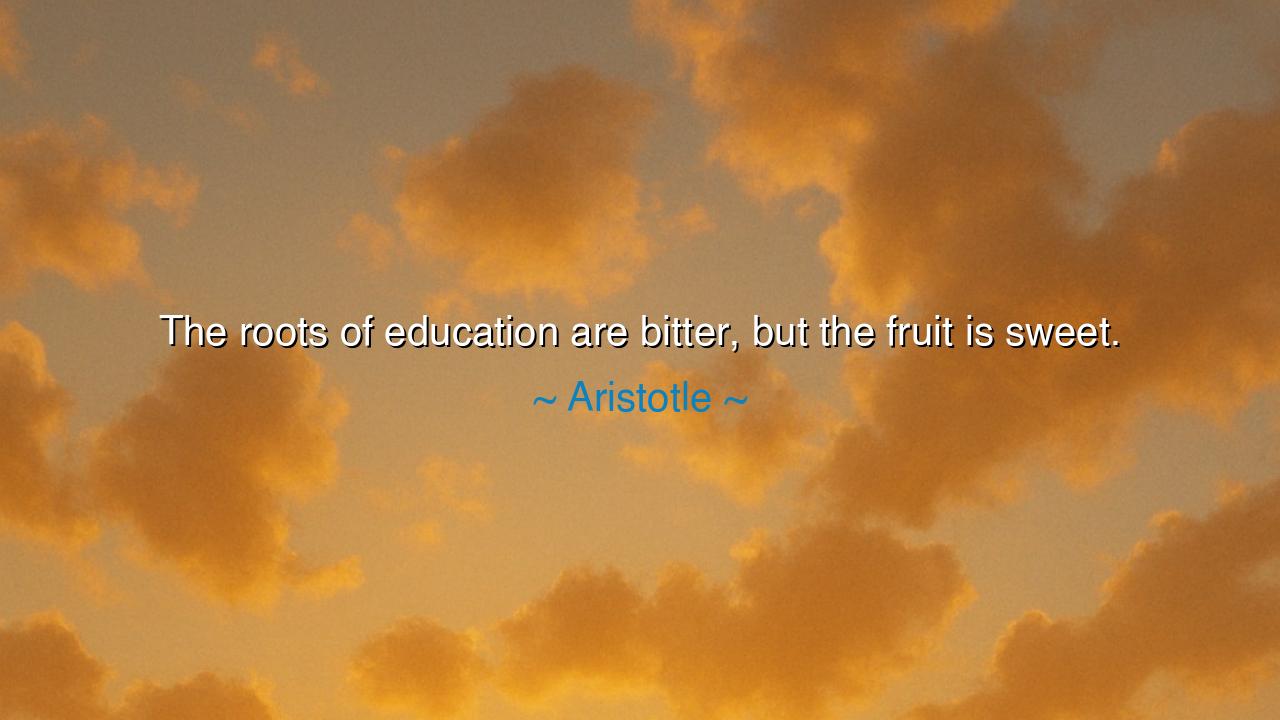
The roots of education are bitter, but the fruit is sweet.






There are truths about the pursuit of knowledge that have echoed through the ages, spoken by sages whose wisdom transcends time. Among these is the insight of Aristotle, who proclaimed: “The roots of education are bitter, but the fruit is sweet.” In these words lies a meditation on the human journey of learning—a recognition that the path to wisdom is arduous, demanding discipline, patience, and endurance. Yet, for those who persevere, the rewards are profound: understanding, insight, and the capacity to live a life of virtue and fulfillment. The bitterness of toil yields the sweetness of enlightenment, a truth as eternal as the human spirit itself.
To comprehend Aristotle’s meaning, one must first understand the nature of education. The roots are bitter because learning requires effort, self-denial, and the confrontation of one’s own ignorance. Knowledge cannot be plucked without labor; insight is not granted without struggle. Children and students endure repetition, correction, and discipline; the mind must stretch, the will must bend, and the spirit must grapple with challenges it may not yet comprehend. Aristotle, observing the rigor of schools and the cultivation of young minds in Athens, knew that education is demanding precisely because it molds character, sharpens reason, and illuminates truth.
The origin of this reflection lies in Aristotle’s life as both student and teacher. A pupil of Plato and the tutor of Alexander the Great, Aristotle understood intimately the sacrifices and discipline required to attain wisdom. He witnessed the labor of mind and body that builds intellect, and he saw that this effort, though often unpleasant, produces fruits far beyond the immediate toil. In cultivating virtue, moral discernment, and intellectual mastery, the student learns that temporary discomfort is the necessary soil for enduring achievement. The sweetness of education is not merely in knowledge acquired, but in the transformation it brings to character and life.
History offers vivid illustrations of this truth. Consider Abraham Lincoln, who, in his youth, had little formal schooling. He walked miles to borrow books, studied by the flickering light of a fire, and disciplined himself to learn law and governance. The roots of his education were bitter—loneliness, toil, and struggle—but the fruit was sweet: he became one of the greatest leaders of a nation, revered not only for knowledge, but for wisdom, judgment, and moral courage. Aristotle’s metaphor is alive in Lincoln’s life: endurance and effort in learning yield results that endure far beyond immediate discomfort.
Even in the realm of the arts, this principle holds. Ludwig van Beethoven, deaf in his later years, labored relentlessly over compositions that challenged both his mind and body. The toil, the repeated failures, and the relentless self-discipline of study were bitter, yet the music he created—the symphonies, sonatas, and concertos—remains among the sweetest fruits of human achievement. The bitterness of practice and preparation was transformed into art that continues to inspire centuries later. Aristotle’s observation resonates across disciplines: the difficulty of learning is inseparable from the magnificence of its outcomes.
The moral dimension of Aristotle’s wisdom is profound. Education is not merely the accumulation of facts, but the cultivation of virtue, discernment, and the ability to live a life in harmony with reason and truth. The bitter roots teach patience, resilience, and humility; they remind us that knowledge is earned, not given. Those who endure the challenges of learning emerge not only informed, but strengthened in character and prepared to navigate life with wisdom. The sweetness of the fruit is therefore both practical and spiritual: it nourishes the mind, heart, and soul.
The lesson for every generation is timeless: embrace the struggle inherent in learning. Do not seek shortcuts or the comfort of immediate gratification, for the roots that require effort produce the fruit that endures. Persist through difficulty, confront your ignorance, and cultivate discipline in study and practice. In doing so, the labor of today becomes the sweetness of tomorrow—a harvest of understanding, mastery, and wisdom.
Thus, let Aristotle’s words echo through the ages: “The roots of education are bitter, but the fruit is sweet.” Endure the challenges of study, embrace the discipline of learning, and let your mind be nourished by the toil that transforms it. For in the bitter roots lies the promise of fruit; in the labor of education lies the reward of wisdom, insight, and a life fully illuminated. Those who persevere taste the sweetness not only in knowledge, but in the power to live with virtue and understanding.






AAdministratorAdministrator
Welcome, honored guests. Please leave a comment, we will respond soon